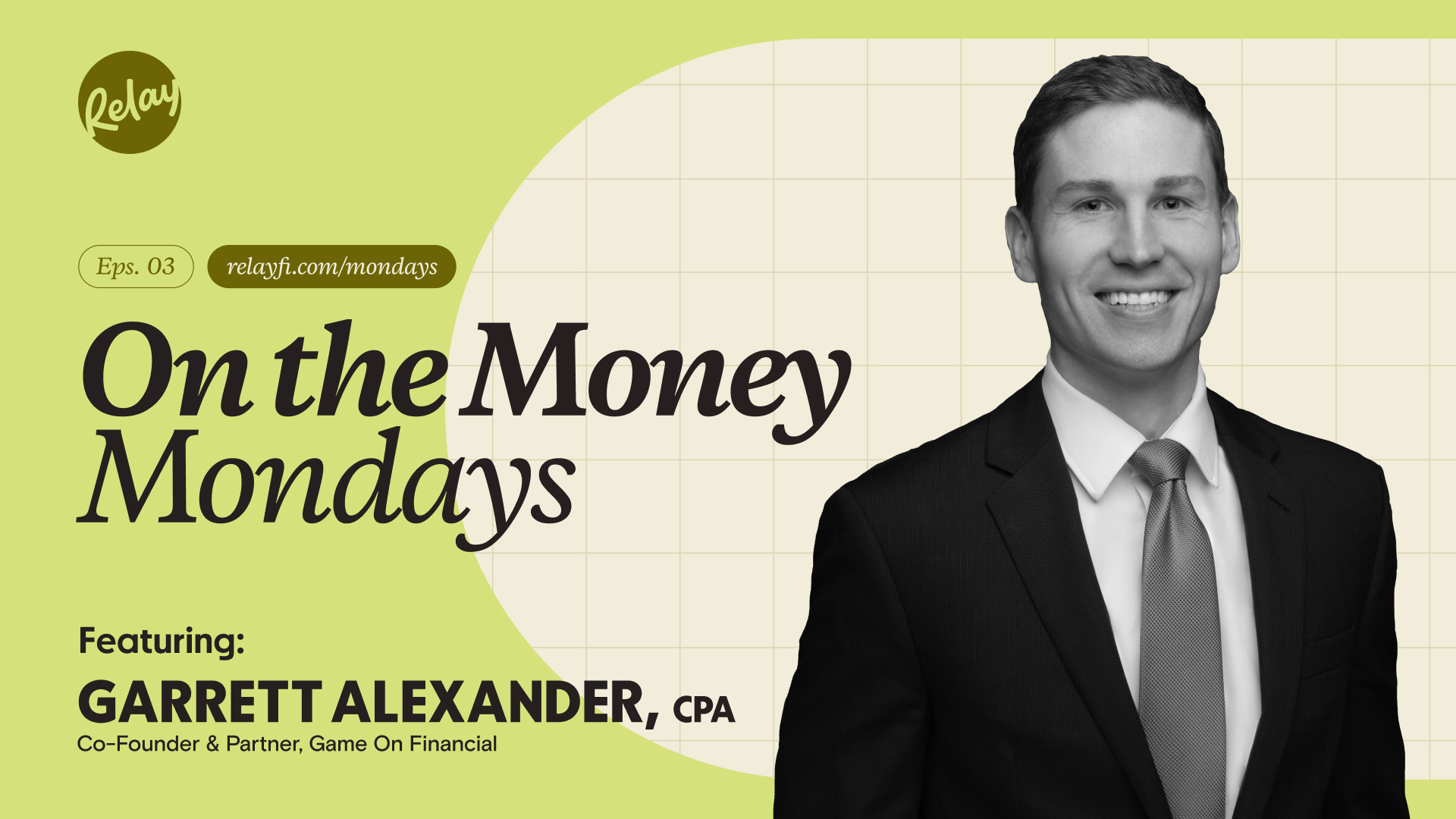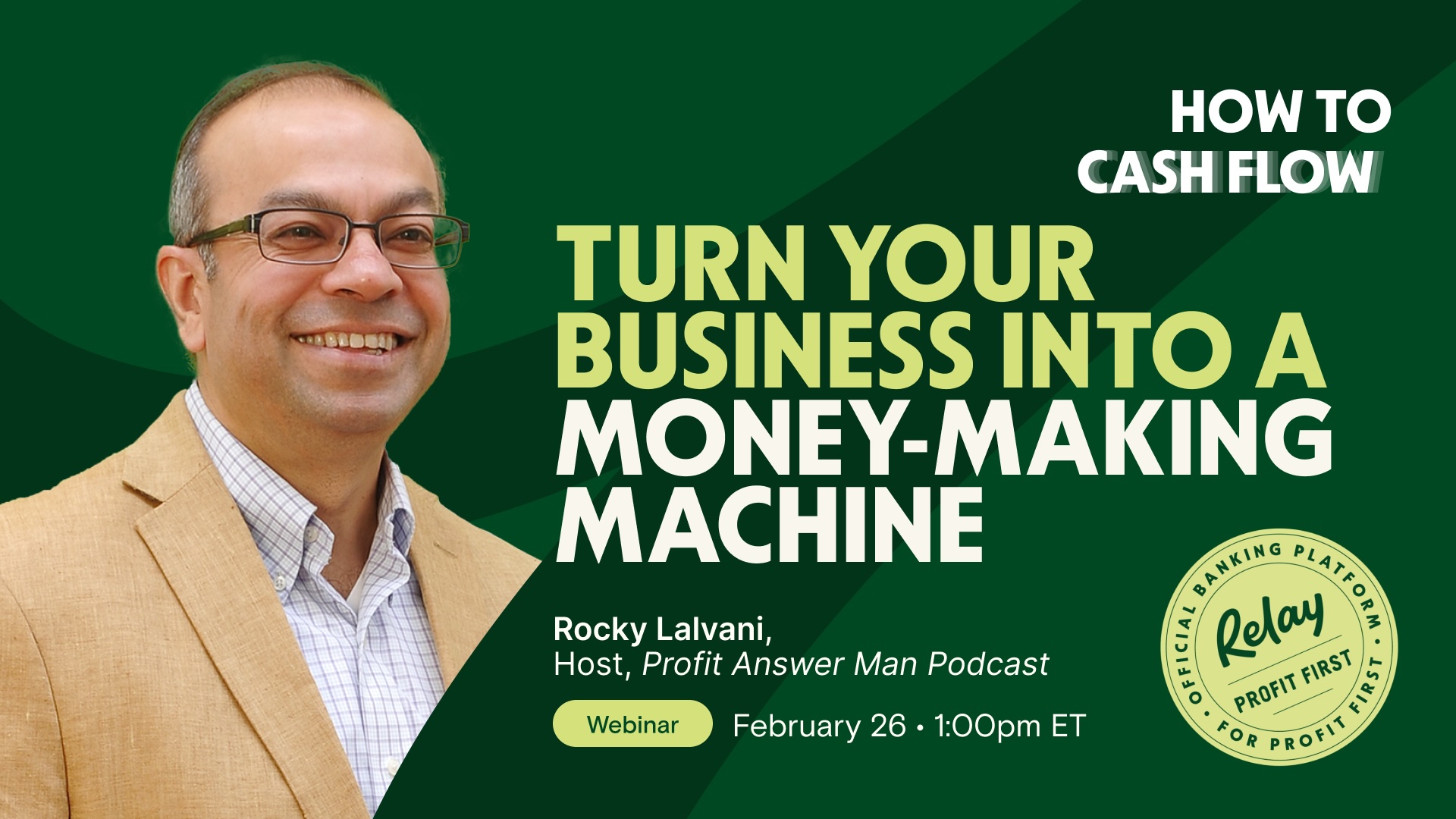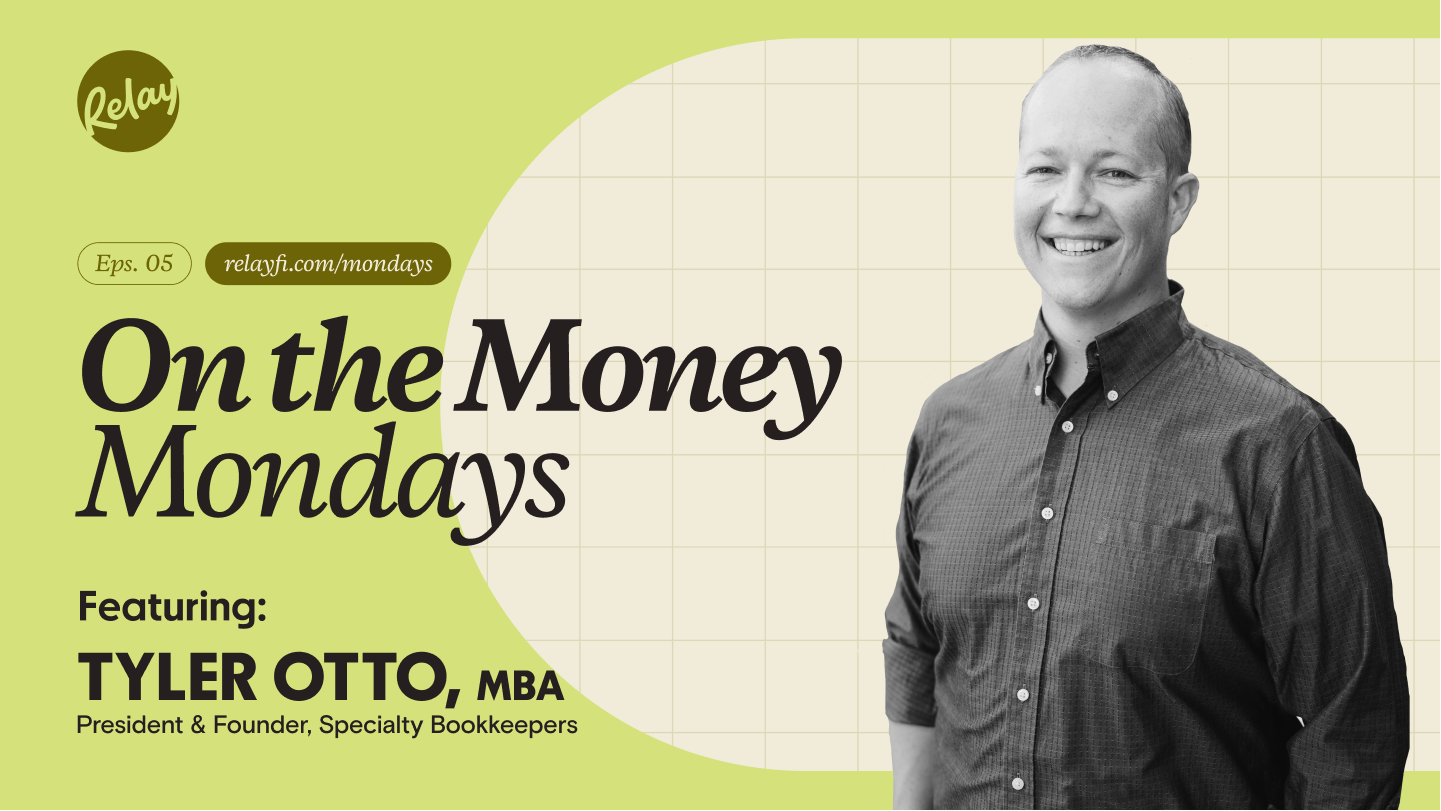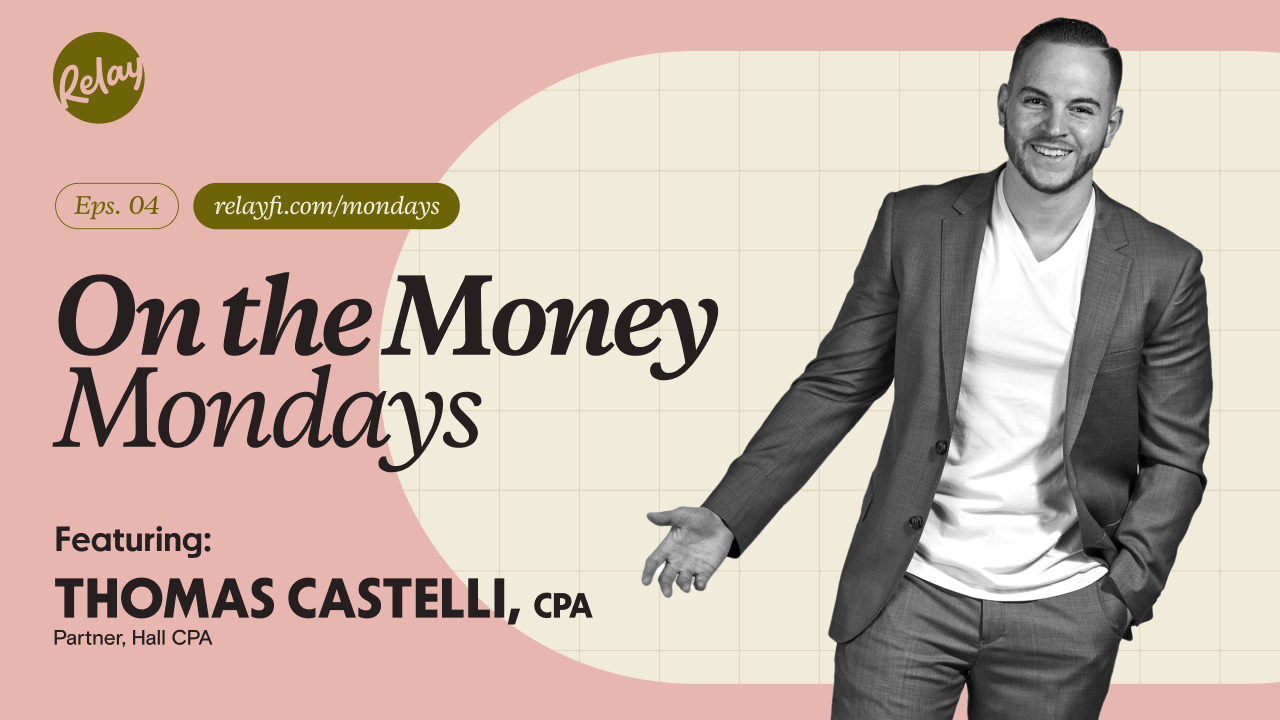What do content creators, influencers and social media entrepreneurs need to know about staying on top of their finances and tax preparation? In Episode #3 of On the Money Mondays, we’re joined by Garrett Alexander, CPA, to walk us through key things you should to know about setting your small business up for success.
Subscribe for future episodes: https://relayfi.com/mondays
Our guest, Garrett Alexander, CPA, is a Partner at Game On Financial — a tax and accounting firm that helps creators navigate financial and compliance issues. Garrett is also the Co-Founder of Orsini & Associates, which provides full accounting services to small businesses. You can find Garrett active on Twitter @YourLocalTaxGuy.
Webinar: Turn Your Business Into a Money-Making Machine
Unlock the secrets to transforming your business from a job into a profitable, cash-generating machine.
Register NowIn this article:
On the Money Mondays, Episode #3
Below is a revised transcript of the above video:
Biggest mistakes made by content creators
Whether you’re a social media influencer, an up-and-coming TikTok creator, or a streamer, there are three common issues that you’re likely to run into as your business grows and you have to tackle tax planning. Here’s where the biggest issues arise, explains Garrett:
No set of books and no bookkeeping whatsoever
No real business relationship with any kind of business bank, with funds being co-mingled with personal accounts
No organization around tax deductions and no access to good tax advice.
Generally speaking, says Garrett, the third point, taxes, is usually the first thing that people come to Game On Financial about. But people often don’t realize that they need the first two in place first.
Need business banking? Check out our guide on how to choose the right bank account.
Tax issues are much more difficult — and more expensive — to resolve when you don't have a clean set of books and proper business banking in the first place. So, what does Garrett recommend to set yourself up for success, both in terms of tax planning and cash flow management?
Setting yourself up for success as a content creator
There are a few things you can do early on to avoid issues in the future. Garrett says that at some point content creators usually see a break in the process, where had a content creator started a little bit sooner trying to get things under wraps, they would've been able to save a lot of time, a lot of money, and maybe a lot in taxes. That’s because in the beginning, while you're small, it's easier to track certain things. Here’s what Garrett recommends:
Make sure your entity structure is set up correctly, and consider getting an LLC if you’re self-employed (Tip: you can get an incorporation company to do this for you)
Open a business banking account — Garrett recommends Relay as it’s easy to set up, gives you clarity into cash flow, and integrates well with your accounting software
Get a bookkeeping software early in the process rather than waiting until year-end to do it. Garrett recommends either QuickBooks Online or Xero for this.
Finally, before the tax season rolls around, it’s wise to consult a CPA, because when people try to do it on their own, they run into all kinds of issues.
On that last point, Garrett explains that by hiring a CPA, naturally you're usually going to get the best end product when it comes to tax returns and tax savings. However, that is only the case if you get the other things right first.
The most important thing here is to start things off right from the beginning, while you're small and while you're capable of tracking these things. That way, you can set up a foundation for success before you get to a point where it's too hard to manage all of these items.
E-sports example: how things go wrong
What happens when business owners don’t track things correctly, commingle business expenses with personal, and seek financial advice too late? Garrett gives an example of working with an e-sports organization, and the painful outcomes that arose.
The e-sports organization came to Garrett’s firm very late, where an entire year of operations had gone by. They had an LLC, but no separate business bank account. Here was the situation in full:
All finances were running through one of the partners’ personal bank accounts
There was no set of books, nothing had been tracked throughout the year
There was no accounting software in place
The organization was engaging professional services very late in the process
The result of this, Garrett explains, the tax situation was going to be grim, but not just based on the organization’s own numbers. Their bill would consist of:
The taxes already owed
The additional taxes that were missed because of no books
The accounting services fee to catch up on all that work quickly
This would be multiple large bills, adding up very quickly in a short timeframe. While it wasn’t a pretty picture, and the client wasn’t happy about it, Garrett’s firm took steps to ensure that it did not happen again. And that's where truly having a tax pro in your corner does help. It costs a little bit more, but you're paying for the communication and the advice that you get throughout the year.
Saving $1,000s: Example when things go right
Contrary to the example of things going wrong, Garrett shares an example of someone reaching out early in the year, well before the tax season, and the effect being proactive had on the business. The situation looked as follows:
The company started up, grew very quickly, and just couldn’t keep up with finances
They recognized the problem and came to Garrett’s firm for advice
Garrett set them up with separate business banking
They set up bookkeeping and started tracking income and expenses
Since it was about 6 months before tax deadlines, the company restructured their payroll to maximize tax savings
Next year, they know what their tax bill was going to be well before the April 15th and March 15th tax deadlines
Even though the company was halfway through the year, that gave sufficient time to adjust and make sure the business is well set up for tax season.
And while the tax bill was still relatively high, the company was able to save tens of thousands of dollars thanks to proactive planning. So while on a smaller scale, the tax savings will differ, taking a proactive approach goes a long way.
If you set everything up right from the beginning, or at least ask for help before year-end, somebody should be able to get in there and make the changes necessary to get you where you need to be. And then from there on, it's actually easy because going into the next year, everything's already there.
Webinar: Turn Your Business Into a Money-Making Machine
Unlock the secrets to transforming your business from a job into a profitable, cash-generating machine.
Register NowDo you need separate entities for different sources of income?
When you work in content creation, you’re more likely to have multiple sources of income. Some creators wonder if they should set up need to set up new business entities if they have multiple revenue streams. Say you make money from YouTube ad revenue, subscriptions, affiliate deals, e-commerce stores, or occasional guest speaker fees — is there any advantage to setting up a new business entity for the different income types?
Garrett’s answer is that this depends on a lot of factors. At face value, the answer may seem pretty simple, but it could also get very complex. Without any additional context, one way to structure your business would be based on the different revenue streams and what they are doing.
So, for example, YouTube ad revenue, money from Twitch, affiliate brand deals — all of these could easily be lumped into one category, and therefore one entity.
Where it gets tricky is if you start adding things like rentals or an e-commerce store, because that will change what’s important for accounting. An e-commerce store, for example, will have very different considerations, like inventory and like sales tax in different states. Whereas with YouTube ad income, sales tax really is a non-event. This is why it makes sense to consult a CPA, because it can get really, really tricky.
Cash vs. accrual accounting for content creators
At some point, content creators need to decide if they should use accrual or cash accounting. What’s the difference, and why should you pick one over the other? Garrett explains.
Differences between accrual vs. cash accounting
Accrual versus cash is kind of a fundamental concept in accounting that has to do with how you record your income and expenses, based on when they happen and certain triggers.
So, let's start with accrual accounting. Imagine you sell a service, for example, accounting work. Let's say you do a tax return, and the tax return costs $100. When you complete the work and you send that invoice out, you record revenue at that time.
Now, let's take the contrary — cash basis accounting. In cash basis accounting, you do not record revenue when you send the invoice, you actually have to wait until you get paid. So for example, if you’re doing a tax return and you’re waiting on payment, you do not record revenue until you get paid the $100.
The same works for our expenses. You run a business here, but you have to pay bills like everybody else. So a utility bill is a great example. You receive a bill from the utility company. Well, in accrual basis accounting, you record the expense when I receive the bill. The utility company has performed the work, you owe them the money, it is therefore an expense at that time. On the contrary, under cash basis accounting, if the utility company sends you a bill, you do not record the expense until you pay it. Three months could go by, six months could go by — until you pay that bill it is not recorded as an expense.
Whether you choose accrual or cash basis accounting, generally speaking, will make the largest difference at year-end. Because throughout the year, most of the time bills get paid within say 30, 60, 90 days. But at year-end, we're looking at a situation where for tax purposes we may not record revenue or expenses until the next year. This could either cause issues, or it could be helpful in some ways. It all depends on your individual circumstances, and there’s no method that is “the best” for everyone.
What should content creators use?
Is accrual or cash basis recommended for content creators? Garrett says that he doesn’t necessarily recommend one over the other. At the end of the day, everything should even out over the course of years.
Generally speaking, cash basis accounting is what people start with because it is the easiest to track. So what you’ll likely fall into by default is cash basis accounting. The question is usually whether it’s worth switching over into accrual accounting, which only makes sense if there’s some benefit to the content creator to do so.
In most cases, you are unlikely to see the benefit of accrual accounting unless you run a large business that has a lot of invoices and a lot of bills that need lead time on processing products.
Content creators deal generally don't run into that issue. In fact, the only time they really invoice other third parties is when perhaps they're invoicing for they did a brand deal or an affiliate deal or something like that, and they're just trying to collect the money. There are a lot of entities that pay net 30, net 60, whatever the case may be, which may warrant looking into accrual accounting. But generally speaking, with things like YouTube ad revenue it doesn't make sense to get into accrual accounting for content creators. They receive money pretty instantly, and then they also pay their bills pretty instantly.
Webinar: Turn Your Business Into a Money-Making Machine
Unlock the secrets to transforming your business from a job into a profitable, cash-generating machine.
Register NowBank with Relay and get cash flow clarity
As Garrett explains above, to get your business finances in order, step #1 is to open a separate business banking account. Which one? "Go bank with Relay," says Garrett, "they are the greatest banking operation known to man." And to see it in action for yourself, you can apply for a new account online here. It takes minutes to get all of your information set up.





